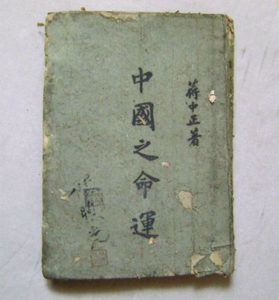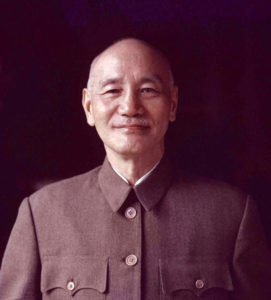To make China strong and independent, it is necessary that all citizens, from the highest to the lowest, must be united in one purpose; that we rouse ourselves for thorough reform, eliminate frivolity by insisting upon honesty, and discourage indolence by upholding active endeavor. Our thinking must be realistic, our living disciplined; our duties must be performed with a sense of responsibility, and our actions must be orderly; and we must seek the truth through practical work, and progressively strive for improvement. Only in this way can China stand on a footing of equality in the Family of Nations and share the responsibility for permanent world peace and the liberation of mankind.
Our Chinese nation must crystalise into a solid, rocklike body of national defense, needless to say, no individual may enjoy the ‘freedom’ of a loose grain of sand. …[I]n the relation between the individual and the state, whether during or after the war, ‘individual freedom’ of the type of loose grains of sand cannot be tolerated.
If China’s adult citizens cannot unite on a large scale, our unity cannot long endure, and we shall experience the humiliation and shame of being ‘a pan of loose sand’ [一盤散沙] and be laughed at for our ‘five minutes of boiling blood’ [五分鐘的熱血].
If our internal affairs are unified, if the strength of our state is centralized, and if, in addition, all the citizens can join in a united effort, then China’s destiny may be epitomized by the following words: ‘Be sincere and united, uphold the Government and obey the law’; and in that event, China’s destiny will be independence and liberty.
It has been previously stated that the inherent virtues of the Chinese people consist of the ability to endure humiliation, accept responsibility, understand thrift, and possess a sense of honor. Because the Chinese people possess these virtues, they are not afraid of strong enemies, and do not take advantage of minorities and the weak, but rather apply their traditional principle of magnanimity, and treat others as they wish to be treated themselves. For this reason they have been for thousands of years the leaders of the people of Asia in ‘preserving the perishing and sustaining those that might be destroyed’, and in ‘helping the weak and assisting the fallen’. As a consequence, there is no historical evidence of economic exploitation or of political domination of the peoples of Asia during the period when China was strong and prosperous; nor was there any imperialism or colonialism.
[A]fter China has become independent and strong, she will definitely not wish the sufferings she has endured to be inflicted upon other countries, and furthermore, after the overthrow of Japanese imperialism, she will not even consider assuming the mantle of Japanese imperialism with the idea of ‘leading Asia’.




